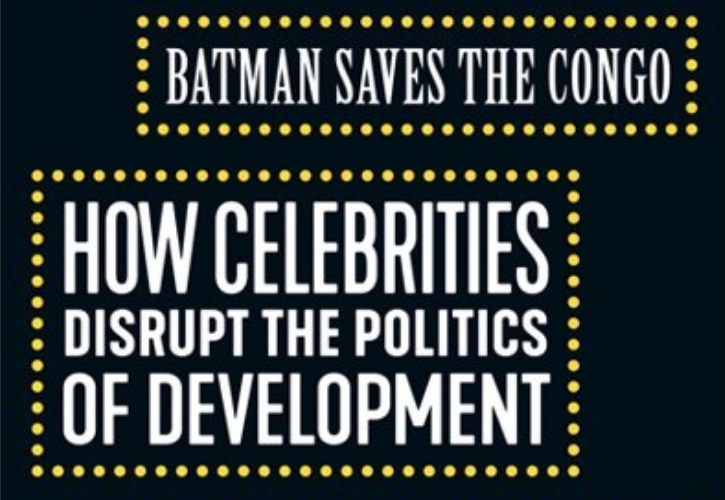Let's Talk Human Rights

Interview With HRC Senior Research Alexandra Budabin on Celebrity Human Rights Advocacy
In June 2021, HRC Senior Researcher Alexandra Budabin and co-author Lisa Ann Richey published Batman Saves the Congo: How Celebrities Disrupt the Politics of Development (University of Minnesota Press). To mark the publication, HRC Postdoc Paul Morrow sat down with Alex to learn more about her work and its application to the Center’s work on the social practice of human rights.
Paul: Your new book addresses a fascinating mix of celebrities, commodities and advocacy campaigns. What first drew you to these issues in human rights and development?
Alex: I have always been interested in the ways in which average people without conventional access to power are able to do something about conflict, genocide and development. And this led me to think about how and where we confront these issues in our daily lives. More than ever, we are learning about human rights through celebrity activism, consumer products that are marketing causes to us and social media campaigns. And while we can’t expect the mass public to read lengthy reports released by human rights organizations, we have to examine these everyday spaces for how they raise awareness, mobilize us to action and impart an understanding of what can be done to address mass atrocity and suffering globally. When Ben Affleck began advocating on development and conflict in the Democratic Republic of the Congo (DRC) with his own organization Eastern Congo Initiative, I knew that his status as a Hollywood figure meant that his words and actions would enjoy extensive media coverage and interest from political elites. And, thus, it became important to track his narratives and gestures — played for both mass and elite audiences — against what was really needed in the DRC.
Paul: One of the questions your book raises is whether consumer behaviors (e.g. buying products or supporting businesses based on celebrity endorsements) can contribute meaningfully to development. Is consumerism ever a legitimate form of activism?
Alex: Over the last few decades, the places where we learn about human rights, humanitarianism and development have expanded enormously, reaching beyond classrooms and museums to supermarkets, malls and online shopping outlets. In our book, we discuss how Affleck was initially slow to go down the route of consumerism as he was more interested in security sector reform in Congo, something that was not easy to convey on a product label. But, as the situation in Congo shifted and his advocacy had to change course, economic development became the focus. His organization created what we call celebrity strategic partnerships to stage Affleck as a product spokesperson - selling a way to save the Congo through chocolate bars, TOMS shoes and, most spectacularly, Starbucks coffee. These cause-related marketing campaigns can be useful for raising awareness, promoting corporate social responsibility (CSR) profiles and highlighting the on-the-ground work of partner organizations. But, the products promoted by Affleck don’t necessarily mobilize consumers to take meaningful social or political action to address the root causes of insecurity in the Congo. The purchase of the product is the start and end of consumer activism for the Eastern Congo Initiative. And, more importantly, we have to consider what else is being sold with these products: a single-story narrative about the Congo, a place where business models for development and the elevation of celebrities as heroic figures are what’s needed to save the country.
Paul: For me, this brings to mind the theme of this year’s Social Practice of Human Rights conference: Between Peril and Potential. Can you talk about how your research engages both sides of that theme — both the perils and the potential of celebrity human rights advocacy?
Alex: One of the main findings of our book is that the celebrity strategic partnerships anchored by Ben Affleck and his organization are increasing the privatization of development. With these partnerships, celebrities bring popular attention and new sources of funding like corporations, foundations and philanthropists. But with these benefits come some pitfalls, as mentioned above, largely around the narrative of development that is conveyed and what is missing. What remains invisible to the public are the politics of development: the elite networks that make such partnerships (and celebrity engagement) possible that include strategic management consultants, the uneven inclusion of Congolese voices and the fact that support for business investment in the Congo may have domestic ramifications. We maintain that celebrity humanitarians like Affleck are good at inhabiting a highly crafted script that tells a good story but fails to disrupt these politics.
Paul: With this book now out, can you tell us a bit about next steps and your current research project?
Alex: Covid permitting, we’re looking forward to speaking widely about the book with both academic and practitioner audiences. We would be happy to conduct Q&A sessions for any university courses that incorporate the book. For my current research related to human rights, I am looking at transnational advocacy around the issue of conflict-related sexual violence (CRSV). With my co-author and UD colleague Natalie F. Hudson, we are investigating the ways in which activists and advocates moved forward the UN Security Council Women, Peace, and Security Agenda around cases of CRSV in the Congo and Darfur. We are taking a broad view of transnational advocacy in order to explore the everyday spaces of celebrity humanitarians, movies, consumer products, and social media campaigns that impact gender security.
Paul: Thanks very much, and congratulations on this fascinating book!
